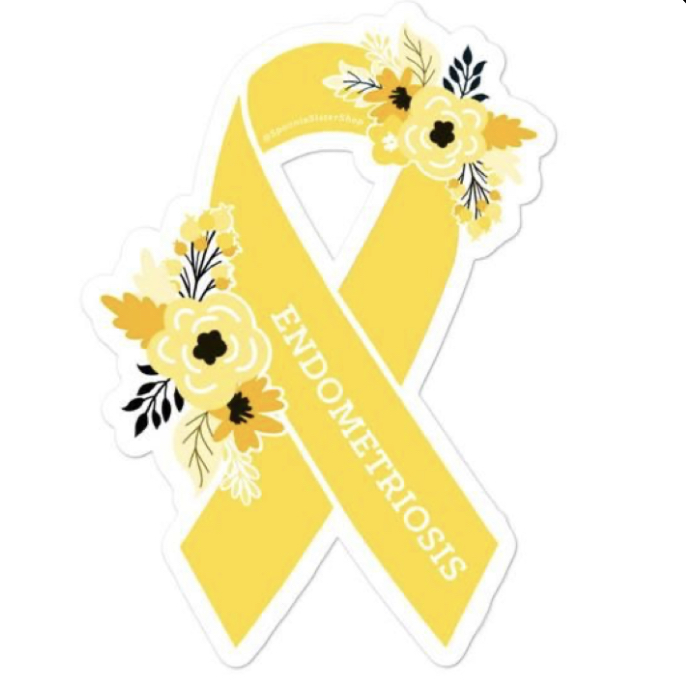Endometriosis…. If I were to ask you about the condition, what do you know?? If you are like most it’s something you’ve heard of but don’t really know much about. You likely also don’t know how it impacts someone who has the disease. That’s okay! But my job is to provide you with a little information so you know what it is all about. Did you know that March is Endometriosis awareness month? Due to that I will be sharing lots of Information and first hand stories about living with Endometriosis.
What is Endometriosis?
According to Endometriosis Foundation of America Endometriosis occurs when tissue similar to the lining of the uterus, or endometrium, migrates outside of the womb to places where it isn’t found naturally. When that happens it may result in result in inflammation. That tissue may then be found in: the abdomen on the ovaries, fallopian tubes, and ligaments that support the uterus. As well as the area between the vagina and rectum; the outer surface of the uterus; and the lining of the pelvic cavity. Endometrial growths may include the bladder, bowel, vagina, cervix, vulva, and abdominal surgical scars.
The Endometriosis Association says that the misplaced tissue can develop into lesions or growths that responds to the menstrual cycle in the same way that the tissue of the uterine lining does. For all women, that tissue will be broken down and shed from the uterus monthly. Menstrual blood flows out of the body through the vagina. However, for those with Endometriosis, the blood and tissue that is broken down and shed from the endometrial growths has no way out. Resulting in internal bleeding, breakdown of the blood and tissue from lesions and inflammation. This can cause pain, infertility, adhesions, buildup of scar tissue and even bowel problems.
What causes Endometriosis?
According to Endometriosis.org there is no known cause of Endometriosis. But it is very likely that certain genes may predispose women to develop this disease. That means that women whose mother or sister have the disease are more likely to be affected. Other things like when a woman starts her period, environment factors and other gynecological factors may influence whether a woman are impacted. There has been some research along the way that seems to link Endometriosis and autoimmune conditions. But that has yet to be proven.
What are the symptoms of Endometriosis? (Only to name a few)
-Pain before or during periods
-Pain with sex
-Infertility
-Fatigue
-Painful urination during periods
– Some may also have diarrhea, constipation, nausea.
Who is affected by Endometriosis?
It is estimated that 200 million women around the world are affected by the disease. Nearly 1 in 10 women during their reproductive years (ie. usually between the ages of 15 to 49) will be impacted. Endometriosis can start as early as a girl’s first period, and may not be resolved by menopause, especially if the woman has scar tissue or adhesions from the disease and/or surgery. Sadly, many women will experience a decade long delay in the diagnosis of the condition.
How is Endometriosis diagnosed?
Diagnosis can be tricky due to the fact that it twill not show up on any CT Scan, X-Ray, MRI or Ultrasound. Other than being diagnosed by the symptoms, which is hard to do because the symptoms on Endo could also be the symptoms of many other things. The only real way to diagnose Endometriosis is surgery. This is done laparoscopically. When surgery is done they go in and take a look around the pelvic area, looking at the reproductive organs, bladder and bowels. If Endometriosis is found they can take care of those spots, and do an ablation while they are in there.
How is Endometriosis treated and is there a cure?
At this time there is no known cure for Endometriosis. However, endometriosis can be treated effectively for some with medication. That being said, most treatments are not suitable for long-term use due to side-effects. Surgery can be an effective treatment, as they remove endometriosis lesions and scar tissue. Success rates of the surgery will vary depending on how extensive the disease is and the surgeon’s skills. Some say pregnancy is a cure because pregnancy may relieve symptoms, but in the long term this is not a cure for the disease.
Having a hysterectomy, with removal of all the disease at the same time, may relieve symptoms. But has not proven to be a cure for all. Removal of the ovaries during a hysterectomy will increase the chances of pain relief. But this will cause the patient to go into immediate menopause.
-Amber



Amber, I just read the blog about being deemed a drug seeker. I asked only for a steroid shot the “Dr.” labelled me a drug seeker in my chart and failed to provide me with any type of treatment or even offer an alternative. She KNEW that I attend a pain clinic and that her comment in my chart could cause serious issues for me later.
Do I possibly have any legal recourse for her actions?
Liz, I am so sorry. I thought I had responded to this a long time ago. I am sorry that you were treated like that. It is so demeaning. As for the legal recourse, I really am not sure. You would have to speak with a lawyer about that. I hope you can find some help and have gotten some treatment that is helpful.
So, surgery is inevitable?
I wouldn’t say it is inevitable for everyone. For me, it was the best course of action at that time. However, there are more treatment options out there now than when I was diagnosed in 2012. If you can find a treatment option that controls your disease then obviously surgery is not inevitable. But for some that will be the best course of action.